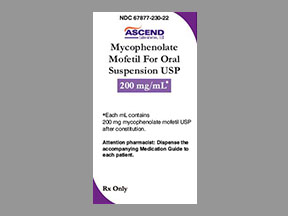
Cellcept Coupons & Savings Card – Discount Prices from $89.15
Brand for: Mycophenolate
My prescription
Edit
160ML of 200MG/ML, Mycophenolate (1 Bottle)
Select pharmacy

CVS
$89.15
COUPON PRICE
Walgreens
$202.60
COUPON PRICE
Albertsons
$203.19
COUPON PRICE
Walmart
$336.36
COUPON PRICECellcept savings card
Show this card to your pharmacist
CVS
$89.15
BIN
ID
PCN
GRP
019876
LH83BDD36C
CHIPPO
LHX
Powered by
Related antimetabolites prescriptions
More prescriptions for organ transplant
Related antimetabolites prescriptions
More prescriptions for organ transplant
Price history for Cellcept (brand) & Mycophenolate (generic)
1 Bottle, 160ML of 200MG/ML
Average retail price for Cellcept
Average retail price for Mycophenolate
Average SaveHealth price for Mycophenolate
Our price history data is based on aggregated prescription data collected from participating pharmacies in America. Our prescription data updates daily to reflect the latest price changes. If you notice a missing data point, it means there wasn't sufficient data available to generate a monetary value for that date.
Over the last 12 months, the average discount price of Cellcept is $249.25 using the SaveHealth savings card. That's an average savings of 84.69% on Cellcept with our discount card.
*Retail prices are based on pharmacy claims data, and may not be accurate when we don't have enough claims.
Cellcept (Mycophenolate) dosage forms
Dosage Quantity Price from Per unit 160ML of 200MG/ML 1 Bottle $89.15 $89.15 160ML of 200MG/ML 2 Bottles $168.00 $84.00 160ML of 200MG/ML 3 Bottles $238.84 $79.61
| Dosage | Quantity | Price from | Per unit |
|---|---|---|---|
| 160ML of 200MG/ML | 1 Bottle | $89.15 | $89.15 |
| 160ML of 200MG/ML | 2 Bottles | $168.00 | $84.00 |
| 160ML of 200MG/ML | 3 Bottles | $238.84 | $79.61 |
What is CellCept used to treat?
CellCept is used to prevent organ rejection in patients who have received a kidney, heart, or liver transplant. It is often used in combination with other medications to suppress the immune system and help the body accept the new organ.
Is CellCept a high risk medication?
CellCept (mycophenolate mofetil) is considered a high-risk medication due to its potential for serious side effects and the need for careful monitoring. It is an immunosuppressant used to prevent organ rejection in transplant patients, and it can increase the risk of infections, certain cancers, and other complications. Patients taking CellCept should be closely monitored by their healthcare provider to manage these risks effectively.
What to avoid when taking CellCept?
When taking CellCept, it is important to avoid the following:1. Live Vaccines: Avoid receiving live vaccines, as CellCept can weaken the immune system and increase the risk of infection.2. Antacids and Cholestyramine: Avoid taking antacids containing magnesium or aluminum, and cholestyramine, as they can interfere with the absorption of CellCept.3. Alcohol: Limit alcohol consumption, as it can increase the risk of liver damage.4. Sun Exposure: Avoid excessive sun exposure and use sunscreen, as CellCept can increase sensitivity to sunlight and the risk of skin cancer.5. Pregnancy: Avoid becoming pregnant while on CellCept, as it can cause birth defects. Effective contraception should be used.6. Grapefruit and Grapefruit Juice: These can affect how the medication is metabolized and should be avoided.Patients should always consult their healthcare provider for personalized advice and before making any changes to their medication or lifestyle.
Is CellCept a chemotherapy drug?
CellCept is not a chemotherapy drug. It is an immunosuppressant medication primarily used to prevent organ rejection in patients who have received a kidney, heart, or liver transplant. It works by suppressing the immune system to prevent it from attacking the transplanted organ.
Does CellCept cause weight gain?
CellCept (mycophenolate mofetil) is not commonly associated with weight gain as a side effect. However, individuals may experience different reactions to medications, and any unexpected changes in weight should be discussed with a healthcare provider.
